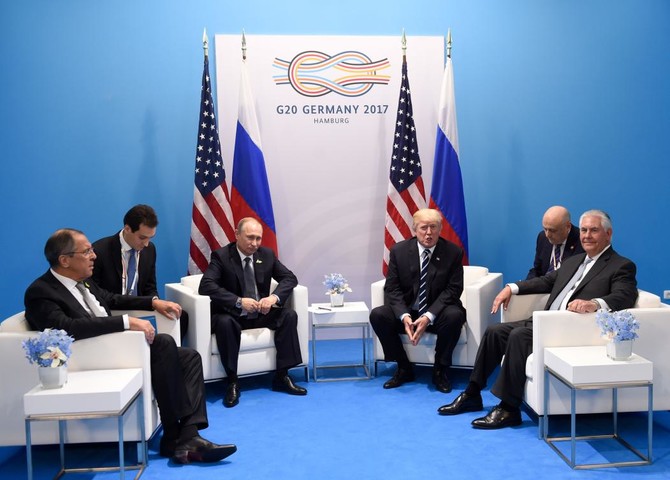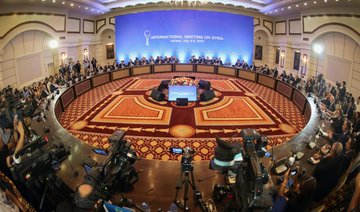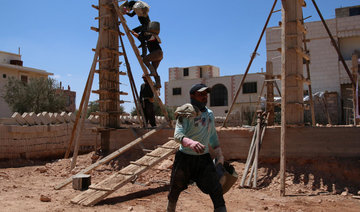HAMBURG, Germany: The United States and Russia struck an agreement Friday on a cease-fire in southwest Syria, crowning President Donald Trump’s first meeting with Russian President Vladimir Putin. It is the first US-Russian effort under Trump’s presidency to stem Syria’s six-year civil war.
The cease-fire goes into effect Sunday at noon Damascus time, according to US officials and the Jordanian government, which is also involved in the deal.
Secretary of State Rex Tillerson, who accompanied Trump in his meeting with Putin, said the understanding is designed to reduce violence in an area of Syria near Jordan’s border that is critical to the US ally’s security.
It’s a “very complicated part of the Syrian battlefield,” Tillerson told reporters after the US and Russian leaders met for more than 2 hours on the sidelines of a global summit in Hamburg, Germany.
Of the agreement, he said, “I think this is our first indication of the US and Russia being able to work together in Syria.”
For years, the former Cold War foes have been backing opposing sides in Syria’s war. Moscow has staunchly backed Syrian President Bashar Assad, supporting Syrian forces militarily since 2015. Washington has backed rebels fighting Assad. Both the US and Russia oppose Daesh militants and say they’re focused on rooting out the extremist group.
The potential pitfalls for the cease-fire are clear — not least the challenge of enforcing it.
Russia Foreign Minister Sergey Lavrov said Russian military police would monitor the new truce. But Tillerson said that was still being worked out. A senior US State Department official said the two countries were close to a deal on that issue and hoped to finalize it in the coming days, raising the prospect it could take effect Sunday with no clear sense of who is policing it.
That the deal was announced before all the details were ironed out was a clear indication of how eager the US and Russia were to cast their leaders’ first meeting as a success. Officials said the deal had been in the works for weeks or months, but came together in time for the meeting.
The deal marks a new level of involvement for the Trump administration in trying to resolve Syria’s civil war.
Trump ordered some 60 cruise missiles to be fired at a Syrian air base in April after accusing Assad’s forces of a deadly chemical weapons attack. But his top military and national security advisers pointedly said they had no intentions of intervening to oust Assad. And they stopped short of endorsing Russian-led or UN peace mediation efforts between Assad’s government and rebel groups.
Israel also is part of the agreement, one US official said, who like others wasn’t authorized to speak publicly on the matter and demanded anonymity. Like Jordan, Israel shares a border with the southern part of Syria and has been concerned about a spillover of violence as well as an amassing of Iranian-aligned forces in the south of the country.
Jordanian government spokesman Mohammed Momani confirmed the accord in a statement that made no reference to Israel’s participation. Syrian government forces and its allies will stay on one side of an agreed demarcation line, and rebel fighters will stick to the other side. The goal is also to enable aid to reach this area of Syria, Momani told state media. US officials said the US, Russia and Jordan had only agreed on that demarcation line last week, clearing the way for a cease-fire to be worked out.
The deal is separate from an agreement that Russia, Turkey and Iran struck earlier this year to try to establish “de-escalation zones” in Syria with reduced bloodshed. The US, wary of Iran’s involvement, stayed away from that effort. Follow-up talks this week in Kazakhstan were unable to produce agreement on finalizing a cease-fire in those zones.
Previous cease-fires in Syria have collapsed or failed to reduce violence for long, and it was unclear whether this deal would be any better.
Tillerson said the difference this time is Russia’s interest in seeing Syria return to stability. It’s an argument top US officials such as former Secretary of State John Kerry cited regularly amid his failed efforts to end a conflict that has killed as many as a half-million people, contributed to Europe’s worst refugee crisis since World War II and allowed IS to emerge as a global terror threat.
Tillerson also repeated the US position that a “long-term role for the Assad family and the Assad regime” is untenable and voiced his belief that Russia might be willing to address the future leadership of Syria, in tones reminiscent of Kerry. Up to now, Assad has rejected any proposals that would see him leave power, contributing to an impasse that has prolonged Syria’s suffering.
Earlier in the week, Syria’s military said it was halting combat operations in the south of Syria for four days, in advance of the new round of Russian-sponsored talks in Kazakhstan. That move covered the southern provinces of Daraa, Quneitra and Sweida. Syria’s government briefly extended that unilateral cease-fire, which is now set to expire Saturday — a day before the US and Russian deal was to take effect.
The US-Russian cease-fire has no set end date, one US official said, describing it as part of broader discussions with Moscow on lowering violence in Syria.
The agreement may also reflect Iran’s increasingly prominent role in Syria.
Washington has been resistant to letting Iranian forces and their proxy militias gain strength in Syria’s south, a position shared by Israel and Jordan. Friday’s deal could help the Trump administration retain more of a say over who fills the power vacuum left behind as the Islamic State is routed from additional territory in Syria.
In recent weeks, US forces have shot down a Syrian aircraft that got too close to American forces, as well as Iranian-made drones. A renewed government offensive against Western-backed rebels and Islamic militants in the contested province of Daraa also is sparking tensions, and Iranian-backed Hezbollah fighters have shifted south to join the fight.
Israel has also struck Syrian military installations on several occasions in the past few weeks after shells landed in the Israeli-controlled side of the Golan Heights. Ahead of the deal, media reports in Israel have suggested unease at any arrangement that relies on Russia policing areas near its frontier.
Implications for Syria aside, the deal marks the biggest diplomatic achievement for the US and Russia since Trump took office. Trump’s administration has approached the notoriously strained relationship by trying to identify a few limited issues on which the countries could make progress, thereby building trust for a broader repair of ties.

















